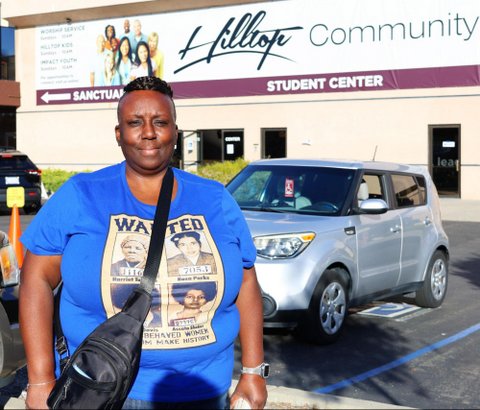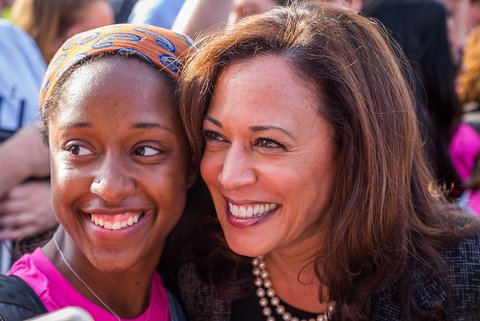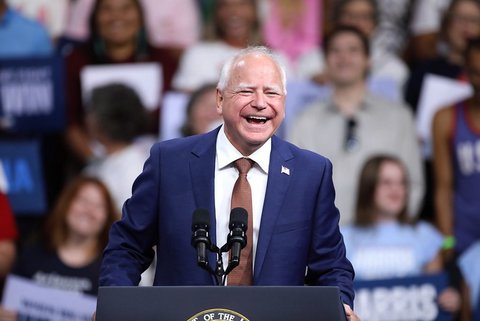
10 Nov On Election Day, Richmond Voters Shared What Matters to Them

Angela Canidate, a Kamala Harris supporter, says as an African American, “I know my ancestors fought and died for me to be able to vote.” (Joe Porrello / The CC Pulse)
By Malcolm Marshall and Joe Porrello
In Contra Costa County on Tuesday, nearly 68% of voters chose Democratic presidential candidate Kamala Harris, while a little over 29% chose Republican Donald Trump, according to unofficial results as of the latest update Friday. But nationally, the presidential race in which voters had the power to elect the first woman of color or the first convicted felon went differently.
Trump won the presidency with 295 electoral votes to Harris’ 226. In the popular vote, Trump received roughly 74 million votes compared with about 70 million for Harris.
In Richmond, Rick Singh voted Republican.
“The reason I came here to vote for Donald Trump is because when he was president, I felt like things were a little bit different,” Singh told the Pulse after voting at Hilltop Community Church. “Things that matter to me like the price of food, rent, and gas — ever since Biden came, these things skyrocketed. To vote for Kamala … I just feel like I’m voting for Biden again.”
Joining Singh at the polls but not in his choice was Alfred Zuniga, once his teacher at Contra Costa College.
“I voted for Vice President Harris because I feel that most of her positions are similar to positions that I hold,” said Zuniga, 91. “As the [attorney general] in Sacramento, she came down and legitimized the first gay marriage in San Francisco during 2013.”
He said he’s followed Harris’ career since she entered politics and believed she was the right choice to lead the country.
“She seems to always have been right at the moment when history is breaking one way or the other,” Zuniga said. “Born of parents from a Caribbean island and somebody who’s African American, and a mother from India, it was kind of like she was being prepared to serve a society that is multi-ethnic or multi-position.”
Zuniga first voted for president in 1956. “And I’ve had the honor of not missing a single election since then.”
A hopeful John Adams Jr. brought his wife and grandchildren with him to vote for Harris, who would have been the first woman — and, of course, first woman of color — to hold the presidency had she been elected.
“I brought the family out. My granddaughter put the ballot in. Hopefully, the ballot that she put in is momentous,” he said.
Adams made clear his feelings about Harris’ competitor.
“I would not vote for Trump. I grew up knowing who he is… a self-centered individual, and as president, he definitely only has himself in mind,” he said. “There’s no way this cat should be president — no way.”
While acknowledging Harris’ suffers some unpopularity in the Bay Area, Adams says she would still be the best choice when considering the alternative.
“We’ve got to keep the big orange blob out,” said 77-year-old Norm Clausen. “For basically the last 10 years, he is on the news multiple times every single day and it gets worse and worse.”
Voting for Harris, he says, “was basically an anti-Trump vote.”
More people outside the polls told the Pulse what issues were behind their votes, both locally, statewide, and nationally.
Clausen said his main concern was the passing of Proposition 3, which protects Californians’ freedom to marry, regardless of their race or gender by removing discriminatory language from the California Constitution stating marriage is only between a man and a woman. California voters approved Prop 3 with 61% of the vote.
Some voters concerned with the economy and affordability said they favored Props 32 and 33, which concerned the state minimum wage and rent control, respectively.
However, unofficial results as of Saturday show that California voters have narrowly disapproved Prop 32 with 51.5% voting no and resoundly rejected Prop 33 with 61% voting against it.
Wearing a shirt with Harris’ face on it, 57-year-old Jerome Gourdine says affordable housing and Harris’ support of women’s rights and reproductive rights, in particular, were behind her vote.
“I would like to see women retain as much right to their bodies as possible. It’s not just their bodies; it’s their futures,” she said. “Frankly, we have a population explosion — so, I’m okay with abortion if the woman agrees to that.”
Karima Lacy, 44, felt similar. “Even being a devout Christian, there are drastic situations that not even God knew that would happen to you. In certain situations you can die if you don’t get rid of the baby. People are traveling to other states, then you become a burden on that city or place.”
Reproductive rights weren’t a determining factor for women alone.
“I’m for women’s rights, and abortion is my main concern,” said Nick Valaris, 44, who brought along his son Beau for his first voting experience.
“My parents always brought me to vote as a child, so I brought my 3-year-old to drop off his mom’s ballot,” he said. “It’s important to teach them young to be part of our community.”
Nearly all voters who spoke with the Pulse agreed on the importance of voting and the ease of casting their ballots in Richmond.
“Well, at least as an African American, I know that my ancestors fought and died for me to be able to vote,” said Angela Canidate, 59. “If you don’t vote, you really can’t say anything derogatory because you didn’t try to make a change.”
Not taking democracy for granted is something Lacy says all can do by getting to the polls. “Just to be given the right to vote is amazing,” she said. “We look at other countries fighting and don’t realize we are fighting for every right that we have — especially women.”
Locally, for Richmond City Council, Jamelia Brown is leading incumbent Melvin Willis, Sue Wilson is ahead of Ahmad Anderson in the race to replace retiring Gayle McLaughlin, and Claudia Jimenez is holding onto her seat. Richmond voters also favored both Measures J and L, which would change City Council and mayoral elections. But only one will ultimately take effect. And Guadalupe Enllana, a parent in the West Contra Costa Unified School District, appears to have taken a school board seat away from incumbent trustee Otheree Christian.
Felix Hunziker told the Pulse on Election Day that he voted for Measure J, which would create a primary system in city elections, but would be fine with “either one because we really need to stop with the split votes and one party wins with 30 to 40% of the vote.” He added that he hoped making the votes “count more” would “be the impetus for people to get out and vote during the primaries as well.”
Additional reporting contributed by Danielle Parenteau-Decker and Denis Perez-Bravo






No Comments